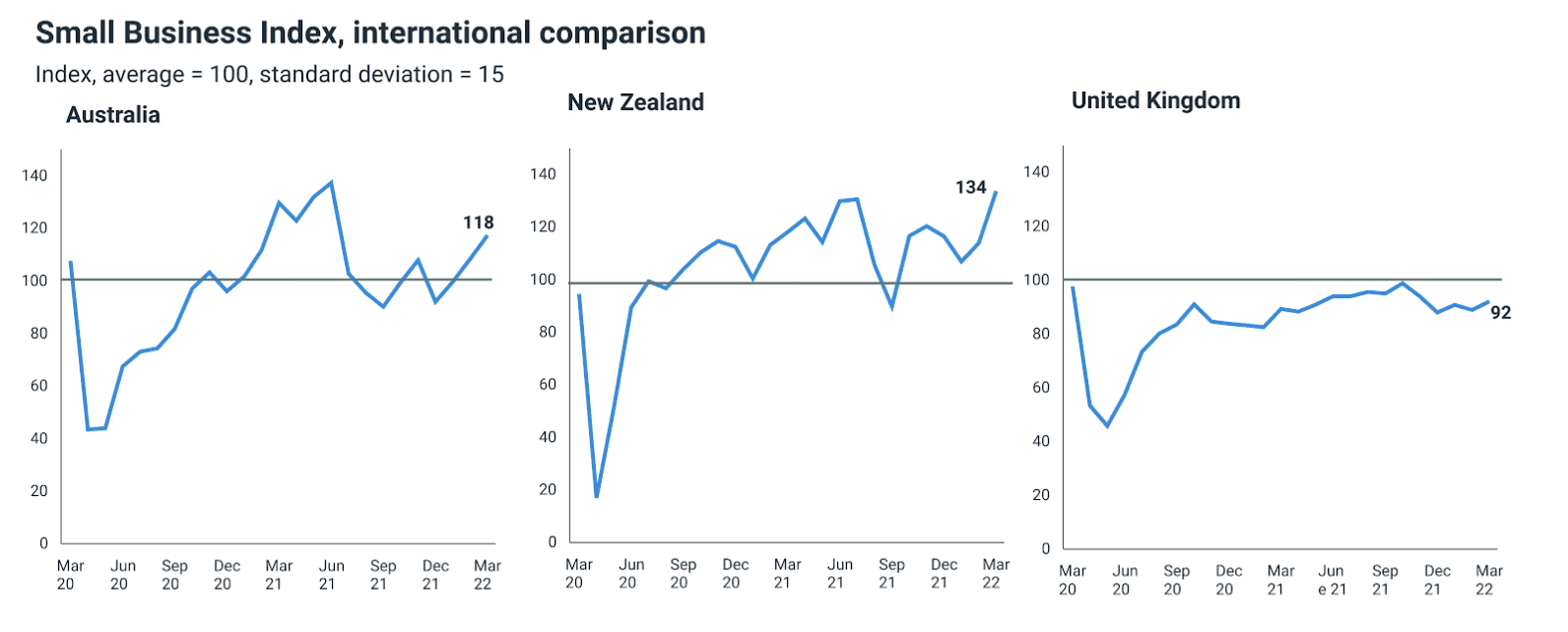
Xero’s data shows small business jobs growth squeezed by staff shortages


The latest Xero Small Business Insights (XSBI) data for March 2022 shows the impact that COVID-19 cases, labour shortages, supply constraints and inflation are having on small businesses in Australia, New Zealand and the UK.
For the month of March, Xero’s Small Business Index, a key indicator of the sector’s health, was 118 in Australia, 134 in New Zealand and 92 in the UK. An index of above 100 indicates the small business sector is performing better than average (average calculated from January 2017 to December 2019) and an index of below 100 means the sector is performing below average.

The jobs market challenge
In recent months our data has shown small business jobs growth slowing across the three countries. In March, jobs grew 2.7% year-on-year (y/y) in New Zealand (the weakest result since June 2020) and fell 3.6% y/y (adjusted1) in the UK and 1.1% y/y in Australia.
The slowdown in jobs growth is largely down to an inability to find staff. This is something I’ve been hearing from our small business customers – that they’re finding it tough to find and hold on to good staff. The robust sales growth that we’ve seen for most of the past year in all three countries suggests small businesses need more workers, but are facing a real challenge finding them.
In the UK, this is proving to be a major obstacle in the recovery of small business. Sales grew 14.1% y/y in March (adjusted1) and it’s great to see that UK small businesses have now, on average, had more than a year of positive sales growth. However, there are now 7.4% fewer people working in small businesses than before the pandemic, as British small businesses are competing for a much smaller pool of available staff to keep up with sales.
In Australia and New Zealand, some sectors are also facing skills shortages as international borders in both countries have been closed to new migrants for two years. I’ve seen the impact of this on small businesses in agriculture that often rely on overseas seasonal workers. The data indicates these businesses are still struggling with agriculture jobs declining 3.6% y/y in New Zealand and 4.0% y/y in Australia in March.
Wages growth putting pressure on small business owners
The XSBI data for March also reveals that these challenging job markets are driving wage rises in all three countries. For instance, wages grew 4.2% y/y in the UK in March, the third consecutive month of wage growth over 4%.
Higher wages can be a positive sign that a small business is doing well and contributing more to the local community by employing staff and supporting higher spending. However, if wages rise too fast it can put the future sustainability of a small business at risk. This research note authored by Xero Economist, Louise Southall, explores small business wage trends in more detail.
We’re seeing many small businesses having to pay higher wages to secure staff, which is putting pressure on them financially as they’re also being hit with price increases and supply issues. I really encourage small business owners to engage with your advisor often to closely monitor your cash flow. Tools like Xero Analytics Plus can help you visually project your potential bank balance up to 90 days into the future and get insights on your business performance, helping you to spot opportunities and mitigate risks ahead of time.
Hospitality businesses experience strong wages growth
In all three countries hospitality small businesses are experiencing strong wages growth, despite having slow jobs growth. In March, hospitality wages rose 7.2% y/y in the UK, 4.9% y/y in New Zealand and 3.5% y/y in Australia. This reflects the challenges these small businesses are facing in attracting people to an industry that’s been incredibly disrupted by the pandemic. Hospitality staff also face a higher potential of exposure to COVID-19 than many other industries through the face-to-face nature of the work, so this is also likely to factor in these higher wages.
Overall, it’s great to see that small business performance is improving. But looking ahead, wages growth is likely to continue accelerating in the next few months as positive sales growth underpins the ongoing need for more employees.
Read more about the XSBI metrics for March in these updates:
Or visit the XSBI homepage.





